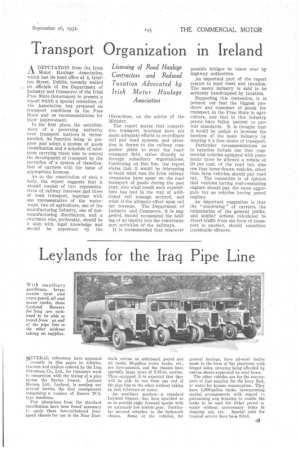Transport Organization in Ireland
Page 53

If you've noticed an error in this article please click here to report it so we can fix it.
ADEPUTATION from the Irish Motor Haulage Association, which has its head office at 4, Grafton Street, Dublin, recently waited on officials of the Department of Industry and Commerce of the Irish Free State Government to present a report which a special committee of the Association has prepared on transport conditions in the Free State and on recommendations for their improvement.
In the first place, the establishment of a governing authority over transport matters is recommended, its function being to prepare and adopt a system of goods classification and a schedule of minimum carrying rates, also to control the development of transport by the operation of a system of classification of carriers with the issue of appropriate licences.
As to the constitution of such a body, the report suggests that it should consist of two representatives of railway interests and three of road transport, together with one representative of the waterways, two of agriculture, one of the manufacturing industry, one of nonmanufacturing distributors, and a chairman who, preferably, should be a man with legal knowledge and should be appointed by the Oireachtas, on the advice of the Minister,
The report states that competitive transport interests have not made adequate efforts to co-ordinate rail and road systems, and attention is drawn to the railway companies' plans to enter the roadtransport field, either directly or through subsidiary organizations. Continuing on this line, the report states that it would be interesting to learn what sum the Irish railway companies have spent on the road transport of goods during the past year, also what result such expenditure has had in the way of additional rail tonnage secured, and what is the ultimate effect upon rail net revenue. The Department of Industry and Commerce, it is suggested, should recommend the holding of an inquiry into the road-transport activities of the railways.
It is recommended that wherever possible bridges be taken over by highway authorities.
An important part of the report relates to road costs and taxation. The motor industry is said to be seriously handicapped by taxation.
Supporting this contention, it is pointed out that the biggest producer and consumer of goods for transport in the Free State is agriculture, and that in this industry prices have fallen nearest to prewar standards. It is thought that it would be unfair to increase the burdens of the basic industry by denying it a free choice of transport.
Particular recommendations as to taxation include one that commercial vehicles equipped with pneumatic tyres he allowed a rebate of 20 per cent. of the road tax, also one that horse-drawn vehicles, other than farm vehicles, should pay road tax. The committee is of opinion that vehicles having coal-consuming engines should pay the same aggregate tax as vehicles having petrol engines.
An important suggestion is that the " shadowing " of carriers, the intimidation of the general public, and similar actions calculated to divert tiaffic from one form of transport to another, should constitute punishable offences.












































































































